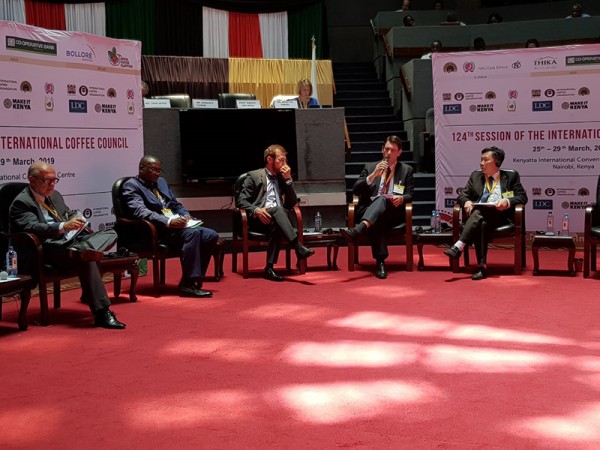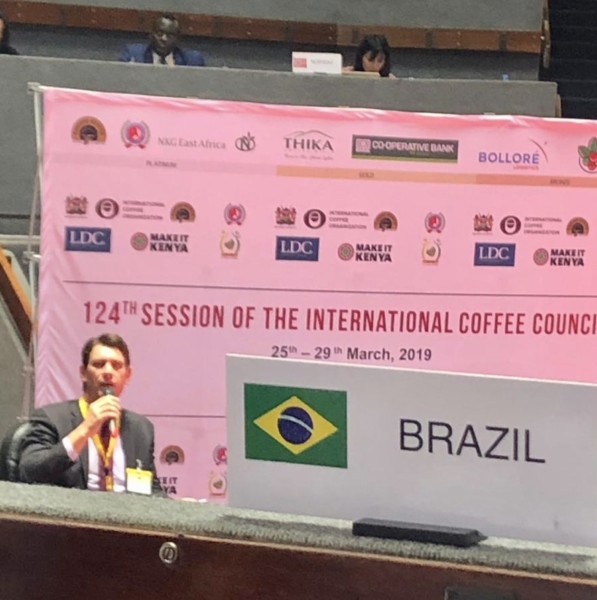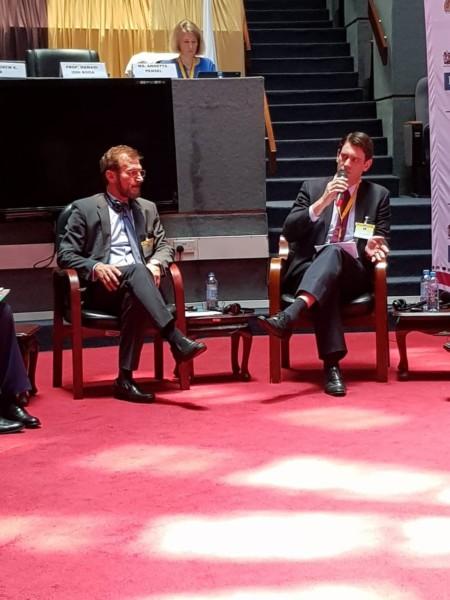
As part of the 2030 Agenda for Sustainable Development, the social, economic and environmental sustainability of coffee growing was widely debated during the seminar: “Coffee: How Sustainable is our future?”, that took place in Kenya on March 25th, 2019.
 The Seminar was an example of collaboration between the ICO (International Coffee Organization), the GPC (Global Coffee Platform) and the Host Government of Kenya during the 124th Session of the International Coffee Council.
The Seminar was an example of collaboration between the ICO (International Coffee Organization), the GPC (Global Coffee Platform) and the Host Government of Kenya during the 124th Session of the International Coffee Council.
Global Coffee agribusiness representatives spoke at the event. Cecafé – Brazil’s Coffee Exporters Council, represented by its Managing Director Marcos Matos, chaired the panel “Public-private collaboration to ensure coffee growing economic feasibility”, with the objective of sharing concrete examples developed in Brazil, success factors and the sector’s challenges.
In addition to Cecafé’s Managing Director, the session also had the attendance of Nguyen Do Anh Tuan – Nguyen Do Anh Tuan – vice-chairman of the Vietnam Coffee Coordination Board and Director General of IPSARD, Vietnam; Emmanuel Iyamulemye Niyibigira – Managing Director of the Uganda Coffee Development Authority, Uganda; Aguinaldo José de Lima – Agribusiness ABDI Consultant, together with moderator Carlos Brando – chairman of the Global Coffee Platform.
During the panel, Marcos Matos introduced Cecafé as the legitimate representative of the Brazilian coffee exporter sector and highlighted the sector’s historical recognition and investment actions aimed at sustainability, considering social, environmental and economic aspects of the entire production chain.
Cecafé has been fostering knowledge and good practices in coffee producing regions by means of programs such as Criança do Café na Escola (Coffee Children in School), Produtor Informado (Informed Producer) and Café Seguro (Safe Coffee)—which have shown important results that support sustainability in all segments of the production chain.
The Coffee Children in School Program, implemented since 2003, has already assisted 45 thousand children of rural public schools. With current investment of BRL9 million, the Program has access to around 137 digital labs, 116 of them with internet access, in 95 different producer regions in the 7 most important states for Brazilian coffee growing.
The Informed Producer Program was created in 2006 to take digital inclusion to rural areas. Since 2015, with the Global Coffee Platform’s partnership, good agricultural practices and attention to environmental and labor legislation were included, based on the coffee grow

ing sustainability curriculum. In addition to the classes, several on-field days were promoted in order to show, in practice, the efforts to have a more sustainable coffee production, with higher productivity and expanded application of research, technology and improvements in the field. By 2019, the Program aims at training approximately 6,000 producers.
Aware of the international demands for the sector, Cecafé was invited by the Institute of the National Pact for Eradication of Slave Labor (InPACTO) and the Catholic Relief Services – CRS – to support the Mesa Café Brasil Project. The initiative aims to promote aspects of transparency and decent work at the coffee growing sector in Brazil and relies on the support of certifiers, governments and important international coffee roasters.
Another highlight is the Safe Coffee Program, which consists of a series of actions to guide producers about procedures in the production process that can ensure, for example, the correct use of agrochemicals, to the benefit of consumers, the quality of coffee grains, and the environment.
Cecafé members have adopted a Code of Ethics and Conduct, which seeks to extend ethical principles and commitment to legal norms in force in the country to the entire supply chain. With the principles established in the code in mind, a Sustainability Seal was created.
Cecafé representative also highlighted the discussions about the “Project Members Initiative – Responsible Use of Agrochemicals”, with partners from the coffee production chain, the agrochemicals industry and several rural extension agencies in Brazil. The export sector demonstrated how the segment’s efficiency and organization enables the establishment of public-private partnerships to promote coffee growing economic feasibility. As an example, it showed how FOB export prices are passed on to Brazilian coffee growers, currently around 84%, and the importance of attaining and monitoring this indicator in other producer and exporter countries.
Finally, during debates at the International Coffee Council Session, Brazil was elected to chair negotiations of the new International Coffee Agreement (ICA). The current agreement is from 2007 and expires in 2021. The ICA is the international treaty that defines the goals for the International Coffee Organization (ICO), whose Executive Director is the Brazilian José Sette.
The Organization gathers exporter and importer countries to cope with the sector’s challenges. Its members represent 98% of the world coffee production and 67% of its consumption. Brazil, as the largest producer and exporter in the world, the second largest consumer, and a reference of sustainability and strict social and environmental laws around the world, will play a leading role in designing the new International Coffee Agreement (ICA).
Cecafé, as member of the Brazilian delegation and partner of the national production, advocates for the modernization of this international entity, so that extensive promotional coffee programs can be carried out in both traditional and emerging markets, particularly in Asia.
Marcos Matos – CECAFÉ CEO
Lilian Vendrametto – CECAFÉ Sustainability Manager


Leave A Comment